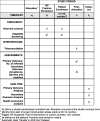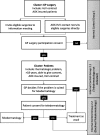Improving cooperation between general practitioners and dermatologists via telemedicine: study protocol of the cluster-randomized controlled TeleDerm study
- PMID: 30355358
- PMCID: PMC6201508
- DOI: 10.1186/s13063-018-2955-2
Improving cooperation between general practitioners and dermatologists via telemedicine: study protocol of the cluster-randomized controlled TeleDerm study
Abstract
Background: Internationally, teledermatology has proven to be a viable alternative to conventional physical referrals. Travel cost and referral times are reduced while patient safety is preserved. Especially patients from rural areas benefit from this healthcare innovation. Despite these established facts and positive experiences from EU neighboring countries like the Netherlands or the United Kingdom, Germany has not yet implemented store-and-forward teledermatology in routine care.
Methods: The TeleDerm study will implement and evaluate store-and-forward teledermatology in 50 general practitioner (GP) practices as an alternative to conventional referrals. TeleDerm aims to confirm that the possibility of store-and-forward teledermatology in GP practices is going to lead to a 15% (n = 260) reduction in referrals in the intervention arm. The study uses a cluster-randomized controlled trial design. Randomization is planned for the cluster "county". The main observational unit is the GP practice. Poisson distribution of referrals is assumed. The evaluation of secondary outcomes like acceptance, enablers and barriers uses a mixed-methods design with questionnaires and interviews.
Discussion: Due to the heterogeneity of GP practice organization, patient management software, information technology service providers, GP personal technical affinity and training, we expect several challenges in implementing teledermatology in German GP routine care. Therefore, we plan to recruit 30% more GPs than required by the power calculation. The implementation design and accompanying evaluation is expected to deliver vital insights into the specifics of implementing telemedicine in German routine care.
Trial registration: German Clinical Trials Register, DRKS00012944 . Registered prospectively on 31 August 2017.
Keywords: Consultation; Implementation; Primary care; Referral; Teledermatology; Telemedicine.
Conflict of interest statement
Ethics approval and consent to participate
The ethics review board of the Eberhard-Karls-University Tübingen gave a positive vote on the study (DNR 395/2017BO1).
Consent for publication
Not applicable.
Competing interests
LW is professor appointed by the Dutch Royal Medical Association at the Department of Medical Informatics at the Academic Medical Centre in Amsterdam; he is also an owner and director of KSYOS, but as such is not involved in this study.
The remaining authors declare that they have no disqualifying factors or conflicts of interest.
Publisher’s Note
Springer Nature remains neutral with regard to jurisdictional claims in published maps and institutional affiliations.
Figures




References
-
- Esch M, Rübsam M, Baum E, Bösner S. Access to the health care system in patients with chronic skin disease. Z Allg Med. 2015;91(4):180–186.
Publication types
MeSH terms
Grants and funding
LinkOut - more resources
Full Text Sources
Medical

